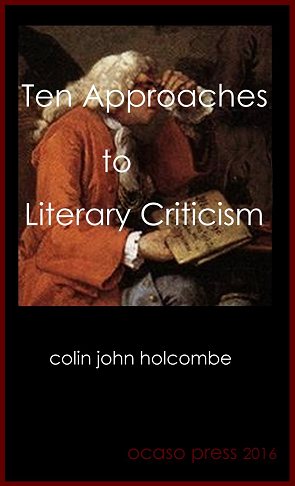A concise guide to the schools of literary
criticism: some seventeen schools are noted in this 150 page free
guide, and ten schools covered in some detail — traditional, the New
Criticism, rhetoric approaches, stylistics, metaphor approaches,
Poststructuralist, myth criticism, Freudian, Jungian and fractal
approaches. All are illustrated with a worked example and supported
with extensive book and Internet references.

Literary criticism is not fashionable today, and has been replaced by theory in many university departments. What does continue to be written tends to concentrate on established figures. Nonetheless, a true appreciation of the great torrent of work that pours off the small presses generally needs something better than today's reviewing, which is often partisan, shallow and/or doggedly optimistic.
A free pdf Literary Criticism ebook.
Literary criticism requires many skills, but
those which the practicing poet needs to acquire are close reading,
explication and evaluation. And the first two because most poems fail
through lack of care. The originating emotion still clots the lines or,
in striving for originality, the work becomes muddled, pretentious or
incoherent. Poems grow through evaluation, that dialogue between
what has been written and what was originally hoped for, between what
the poems say now and what it might with further work. Literary
criticism helps the poet see his work as his readership will, honestly
and from many viewpoints.
But the critic's eye is a rare gift, rarer than sainthood, Housman
thought, and matters have lately become more problematic. Criticism is
not fashionable, and has been replaced by literary theory in many
university departments. The criticism that continues to be written
naturally concentrates on established figures. The remainder, the
reviewing/criticism appraising the great torrent that pours off the
small presses, is often partisan, shallow and/or doggedly optimistic.
Even the aims of criticism seem somewhat doubtful. No single critical
approach seems invariably successful, and insights from differing
approaches do not necessarily cohere. Nothing brings finality of
judgement, moreover, and one critic's findings can be undone by
another's ingenuity. Much more damaging, the premises even of literary
theory have been uprooted by radical theory.
What does evaluation hope to achieve?
There are many schools of thought, but all take as their starting point
the analysis of the reader's or listener's response. Poems may be
complex, requiring a good deal of explanation or even correction of
corrupt scripts, but there has to be an immediate impact of some sort:
not very strong, and not blatantly emotional necessarily, but something
that allows the critic to ask: how is this obtained? how significant is
it? how does it compare with similar works? No impact and there is
nothing to analyze. The work has failed, at least where that particular
reader is concerned, and no amount of critical cleverness, literary
allusions and information will bully him into responding to what he
cannot feel.
But who is the reader? Each and everyone, as Stanley Fish might claim,
or Milton's "select audience though few"? Poets may not make money but
they still have outlets to consider. Whom are they writing for - the
editors of leading magazines, friends, society at large, or themselves?
And to say something significant about the world around them, to
resolve personal quandaries, to gain a literary reputation with those
who count? In an ideal world all aims might be served by the one work,
but the world is not ideal, and aims needed to be sorted out.